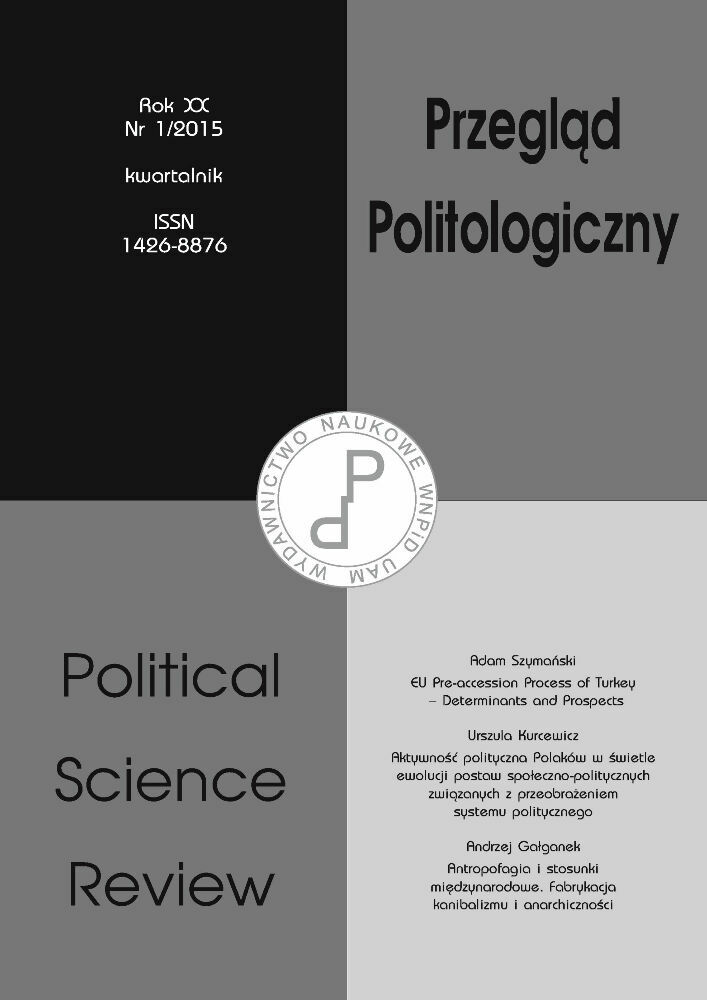Abstrakt
Celem artykułu jest określenie roli i znaczenia diasporalnych grup interesu w systemie politycznym Stanów Zjednoczonych oraz ocena ich realnego wpływu na przebieg wyborów federalnych w tym państwie. Przedmiotem analizy jest działalność żydowskich organizacji diasporalnych określanych potocznie mianem „lobby pro-izraelskiego”. W ramach postawionego problemu badawczego opisane zostały również narzędzia oraz mechanizmy wykorzystywane przez żydowskie grupy nacisku politycznego w zakresie wywierania wpływu na instytucje demokratyczne w USA.
Bibliografia
Ambrosio T. (2002), Ethnic identity groups and US foreign policy, w: Ethnic identity groups and US foreign policy, red. T. Ambrosio, London.
Andrejuk K. (2010), Koncepcja diaspory w naukach społecznych, w: Mozaika przestrzeni transnarodowych. Teorie – metody – zjawiska, red. Ł. Krzyżanowski, S. Urbańska, Kraków.
Atieh J. (2010), Foreign agents. Updating FARA to protect American democracy, „University of Pennsylvania Journal of International Law”, vol. 31.
Bard M. (2007), Will Israel survive? New York.
Chosen for what? Jewish values in 2012. Findings from 2012 Jewish values survey (2012), red. R. Jones, D. Cox, Public Religion Research Institute, Washington.
Cohen R. (2008), Global Diasporas. An Introduction, London–New York.
Cohen S., Abrams S. (2008), Israel off their minds: The diminished place of Israel in the political thinking of young Jews, The Berman Jewish Policy Archive, NYU Wagner 2008 National Survey of American Jews, New York.
Cohen S., Kelman A. (2007), Beyond distancing: Young adult American Jews and their alienation from Israel, The Berman Jewish Policy Archive, Jewish Identity Project of Reboot, NewYork.
Conservatives launch group to attack supporters of Obama’s Israel policies, 13.07.2010, „Jewish Telegraphic Agency”, http://www.jta.org/news/article/2010/07/13/2740043/conservatives-lanch-pro-israel-group, 9.04.2013.
Faist T. (1999), Transnationalization in international migration: implications for the study of citizenship and culture, Oxford.
Garret S. (2013), Super PACs in federal elections. Overview and issues for Congress, Congressional Research Service Report, Washington.
Glazer N., Moynihan D. (1970), Beyond the melting pot: The Negroes, Puerto Ricans, Jews, Italians, and Irish of New York City, 2nd edition, New York.
Glazer N., Moynihan D. (1975), Introduction, w: Ethnicity. Theory and experience, red. N. Glazer, D. Moynihan, Cambridge.
Goldstein D. (2011), Why fewer young American Jews share their parents’view of Israel, 29.09.2011, „Time”.
Herbut R. (1999), Interes polityczny, w: Studia z teorii polityki, t. I, red. A. Jabłoński, L. Sobkowiak, Wrocław.
Jasiecki K., Molęda-Zdziech M., Kurczewska U. (2006), Lobbing. Sztuka skutecznego wywierania wpływu, Kraków.
Kearney K. (1987), Private citizens in foreign affairs: A constitutional analysis, „Emory Law Journal”, vol. 36.
Magleby D. (2004), The importance of outside money in the 2002 congressional elections, w: The last hurrah. Soft money and issue advocacy in the 2002 congressional elections, red. D. Magleby, J. Monson, Washington.
Magleby D., Tanner J. (2004), Interest-group electioneering in the 2002 congressional elections, w: The last hurrah. Soft money and issue advocacy in the 2002 congressional elections, red. D. Magleby, J. Monson, Washington.
Mastromarco D., Saffer A., Zielinski M., Biedrzycka U., Hryciuk K. (2005), Sztuka lobbingu w Polsce, Warszawa.
McCormick J. (2012), Ethnic interest groups and American foreign policy. A growing influence? w: Interest groups politics, 8th edition, red. A. Cigler, B. Loomis, Washington.
National Pledge for Unity on Israel (2012), Anti-Defamation League and American Jewish Committee, http://archive.adl.org/unitypledge, 13.03.2013.
NessI.(1999), Encyclopedia of interest groups and lobbyists in the United States,vol.2,NewYork.
Newhouse J. (2009), Diplomacy Inc. The influence of lobbies on US foreign policy, „Foreign Affairs”, vol. 88, nr 3.
Novick P. (2000), The holocaust in American life, Boston–New York.
OlsonM.(1975), Thelogic of collective action. Public goods and the theory of groups,Cambridge.
Pollak N. (2012), ECI Documentary: Daylight: The Story of Obama and Israel, Emergency Committee for Israel, http://www.committeeforisrael.com/eci_documentary_daylight_the_story_of_obama_and_israel, 10.04.2013.
Sheskin I. (2000), American Jews, w: Ethnicity in contemporary America. A geographical appraisal, 2nd edition, red. J. McKee, Lanham.
Sheskin I. (2013), Jewish voting patterns and the 2012 elections, University of Miami, http://www.jewishdatabank.org/Archive/N-Jewish_Vote_2012_Slide_Set.pdf, 12.04.2013.
Stern J. (2012), We can do better than Ron Paul, Emergency Committee for Israel, http://www.committeeforisrael.com/we_can_do_better_than_ron_paul, 10.04.2013.
Straus J. (2013), Lobbying registration and disclosure: The role of the Clerk of the House and the Secretary of the Senate, Congressional Research Service Report, Washington.
Terry J. (2005), US foreign policy in the Middle East. The role of lobbies and special interest groups, London.
Toobin J.(2002), Tooclosetocall.Thethirty-six-daybattletodecidethe2000election, NewYork.
Vertovec S. (1999), Three meanings of ‘diaspora’ exemplified among South Asian religions, „Diaspora”, vol. 7, nr 2.
Walt S., Mearsheimer J. (2007), The Israel lobby and U.S. foreign policy, New York.
Wielhouwer P. (2009), Religion and American political participation, w: The Oxford handbook of religion and American politics, red. C. Smidt, L. Kellstedt, J. Guth, New York.
